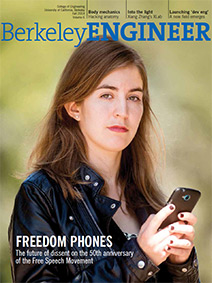Smart spoons

Anupam Pathak with Liftware (Photo by Daniel McGlynn)
Anupam Pathak’s (B.S.’04 ME) idea to build a device to assist people with Parkinson’s disease evolved from helping soldiers survive combat. Pathak started his doctoral research at the University of Michigan in 2004, at the height of U.S. troop deployments to Iraq and Afghanistan. Field reports revealed large numbers of troops facing stress-induced tremors during combat. A soldier with shaky hands is dangerous; tremors were actually affecting casualty rates.
Pathak researched the actuator, the part of a weapon-stabilizing device that counters the tremor. By the time he graduated in 2009, he was thinking about other applications for stabilization technology and learned that more than 10 million people in the U.S. are facing tremor-related challenges. “It turns out that a solution does not exist for a lot of people,” Pathak says.
After more than a year of R&D, Pathak founded Lift Labs in 2012. Their first product, Liftware, consists of a mechanized handle with different attachments. The sensor in the handle interacts with the actuator to counter the tremor in a user’s hand.
While designing, building and getting feedback about Liftware, Pathak says he thinks back to an engineering ethics class he took as an undergraduate at Berkeley. “We were taught to think about who you are affecting by your work. I think that is so important in how we develop this product.”
In September, Lift Labs was acquired by Google and will be part of Google’s life sciences division.

